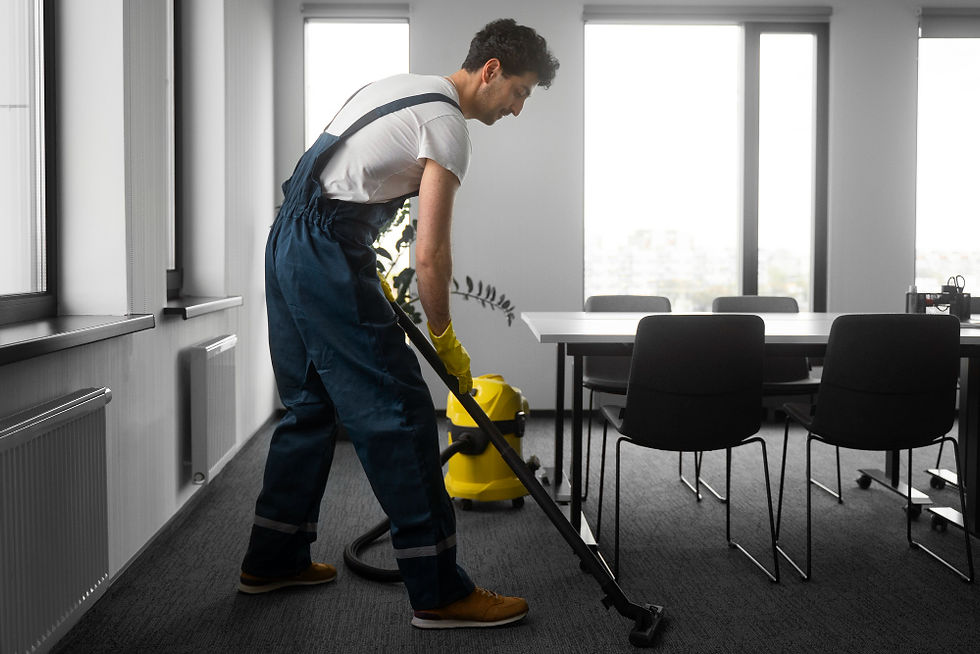The Hidden Costs of Poor Office Hygiene (And How to Avoid Them)
- Kevin Sibille
- Jul 23, 2025
- 4 min read

When you think of office hygiene, you probably imagine clean desks, sparkling floors, and fresh-smelling restrooms. But what happens when cleaning gets pushed aside? The effects go far beyond just appearances. Poor office hygiene can quietly hurt your business—affecting employee health, productivity, client trust, and even your bottom line.
In this blog, we’ll explore the hidden costs of poor office hygiene, why they matter more than you might think, and how maintaining a clean workspace can protect your business from unnecessary risks.
If you want to learn more about how professional cleaning helps, don’t forget to check out our full guide on the benefits of commercial cleaning services.
What Is Poor Office Hygiene?
Poor office hygiene refers to the lack of cleanliness and sanitation in a workplace. It’s more than just a dusty desk—it includes:
Dirty bathrooms or kitchens
Overflowing trash bins
Unclean air vents or filters
Stained carpets or neglected floors
Germ-filled shared surfaces like doorknobs, keyboards, and meeting tables
This might not seem urgent at first, but over time, it adds up—both in visible mess and invisible damage.
1. Increased Employee Sick Days
One of the most direct effects of a dirty office is the spread of illness. Germs thrive on shared surfaces—elevator buttons, keyboards, phones, and breakroom counters. Without regular cleaning and disinfecting, employees are more likely to catch colds, flu, or other infections.
Why this matters:
Sick days disrupt work schedules
Projects get delayed
Team morale can drop
Businesses lose money paying for absentee workers
Did you know? The Centers for Disease Control and Prevention (CDC) estimates that productivity losses linked to absenteeism cost U.S. employers $225.8 billion annually.
A clean office isn't just healthier—it’s smarter for your business.
2. Reduced Employee Productivity
Even if your employees aren’t getting sick, working in a messy or unclean space can still reduce performance. Dusty air, cluttered desks, and foul smells can make it hard to focus. Dirty surroundings also impact mood and motivation.
Real-world example:
Imagine trying to do your best work in an office with a stained carpet, dirty microwave, and overflowing bins. Not very inspiring, right?
A fresh, well-kept workspace helps people think clearly, stay motivated, and feel proud of where they work. That’s why companies that invest in regular cleaning often report better employee performance and satisfaction.
3. Poor First Impressions on Clients and Visitors
Your office says a lot about your business. When clients or guests visit, they notice things—especially if something feels off. Dirty restrooms, dusty furniture, or funky smells can leave a negative impression, even if your service is top-notch.
Why this matters:
Clients might question your attention to detail
Visitors may feel uncomfortable or unsafe
You risk losing deals or damaging your brand reputation
Think of it this way: a clean office builds trust. It shows professionalism, care, and reliability—qualities every client values.
4. Higher Maintenance and Repair Costs
When cleaning is skipped regularly, grime and dirt don’t just disappear—they build up in hidden places. Over time, this can cause damage to:
Carpets and flooring
Office equipment (like printers or computers)
HVAC systems (dust in vents reduces efficiency)
Furniture and fixtures
Example:
If air filters aren’t cleaned regularly, dust circulates through your HVAC system, reducing air quality and making your system work harder—leading to expensive repairs or replacements.
Routine cleaning might seem like an added cost, but it’s actually a preventive investment. You’ll spend far less keeping things clean than fixing damage caused by neglect.
5. Legal and Compliance Risks
Depending on your industry and location, businesses are required to follow certain hygiene and cleanliness standards. These regulations are put in place to protect employee health and safety.
Ignoring these rules could lead to:
Fines from health inspectors
Legal issues related to employee complaints
Workplace accidents or hazards
Damage to your company’s reputation online and offline
Whether it’s OSHA guidelines or local health codes, maintaining a clean work environment is not optional—it’s part of running a responsible business.
How to Avoid These Hidden Costs
The good news? These risks are avoidable with simple, consistent practices. Here’s what you can do:
1. Create a Cleaning Schedule
Define what needs to be cleaned daily, weekly, and monthly. Include areas like:
Bathrooms and kitchens
Desks and meeting rooms
Trash bins and recycling
Air vents and windows
2. Educate Your Team
Encourage employees to:
Keep their desks tidy
Wipe down shared surfaces
Report cleanliness issues
A team that cares about cleanliness helps maintain hygiene between professional cleanings.
3. Hire a Professional Cleaning Service
Professional cleaners go beyond surface-level tidying. They have the tools, products, and experience to sanitize your workspace properly—helping you avoid all the hidden costs we’ve discussed.
This is where the real benefits of commercial cleaning services come into play. From better air quality to reduced liability, it’s a smart move for any business.
Final Thoughts
Poor office hygiene can cost your business more than you realize—from lost productivity and sick days to damaged reputations and legal risks. The impact might not be obvious at first, but over time, it adds up.
The solution? Stay proactive. A clean office is more than a nice-to-have—it’s essential for a healthy, professional, and successful workplace.
Ready to protect your business from the hidden costs? Start by investing in consistent, high-quality commercial cleaning—and enjoy a workspace that works for everyone.



Comments